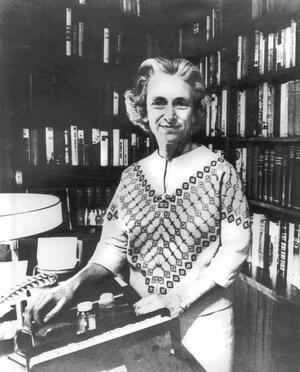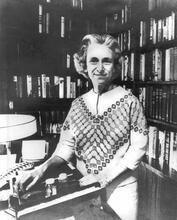Barbara W. Tuchman
Born into an influential family, Barbara Tuchman volunteered at the age of 21 as a researcher at the American Council of the Institute of Pacific Relations. She also became foreign correspondent for her father’s magazine The Nation, reporting on the Spanish Civil War from Madrid. Her first book was published in 1938. Her work for the Office of War Information during WWII further focused her attention on the history of war, and she wrote histories of the relationship between Britain and Israel, the American Revolution, and modern China. While some historians criticized her lack of a PhD, Tuchman earned accolades for her readable, engaging style that made history accessible to a wider audience and earned her two Pulitzer Prizes.
Barbara W. Tuchman was one of America’s foremost popular historians and winner of two Pulitzer Prizes for The Guns of August and Stilwell and the American Experience in China.
Early Life and Education
Tuchman was born into a prominent New York family on January 30, 1912. Her father, Maurice Wertheim, was an international banker, president of the American Jewish Congress, honorary trustee of the Federation of Jewish Philanthropies and fund-raising chair in 1947, trustee of Mount Sinai Hospital in New York, owner of The Nation, art collector, sportsman, and a founder of the Theatre Guild. Her mother, Alma, was the daughter of diplomat Henry Morgenthau, Sr., who served as ambassador to Turkey and Mexico under President Woodrow Wilson. She was the second-born of three daughters; her sisters were Josephine (Pomerance), who became active in the peace movement and died in 1980, and Anne W. Werner, who died in 1996.
Growing up Tuchman was influenced by the Twin Series of children’s books by Lucy Fitch Perkins; George A. Henty, who wrote swashbuckling imperial adventures; Sir Arthur Conan Doyle, author of the Sherlock Holmes mysteries; Jane Porter; and the historical novels of Alexandre Dumas. She spent childhood summers in Europe with her parents. She attended Walden School before entering Radcliffe College. Her studies there concentrated on history and literature, and she received her bachelor’s degree in 1933. She studied under Irving Babbitt and C. H. McIlwain, writing an honors thesis entitled “The Moral Justification for the British Empire.”
Journalist to Historian
Tuchman lived a very privileged life. Upon graduation, she accompanied her grandfather to the World Economic Conference in London. She volunteered as a researcher and editorial assistant at the American Council of the Institute of Pacific Relations from 1933 to 1935. At age twenty-four, she contributed to the prestigious journal Foreign Affairs. In 1934, she went to Tokyo for a year. She spent a month in Peking and returned to America in late 1935 via the Trans-Siberian Railway, Moscow, and Paris.
Tuchman became staff writer and foreign correspondent for The Nation from 1933 to 1937, a journal owned by her father until 1937. As a correspondent for The Nation, she went to Valencia and Madrid, reporting on the Spanish Civil War. This led, in 1938, to her first book, The Lost British Policy: Britain and Spain since 1700, about British policy toward Spain and the western Mediterranean. During World War II, she worked at the Office of War Information. Traveling in Asia and Spain during major military conflicts prefigured Tuchman’s interest in the history of the world of war.
Writing Style and Success
Though she wrote about historical events, Tuchman’s relations with professional academic historians were uneasy. According to her, her lack of academic title and graduate degree was a benefit: “It’s what saved me. If I had taken a doctoral degree, it would have stifled any writing capacity.” She accused historians of producing over-detailed studies that were unreadable.
Instead, Tuchman preferred the literary approach. She was regarded by some as more of a summarist than an explorer of fresh sources, ideas, and methods. She was not a historian’s historian; she was a layperson’s historian who made the past interesting to millions of readers. Her prescription for writing was “the writer’s object is—or should be—to hold the reader’s attention.” She visited the battle sites involved in her histories to increase realistic detail. But she chided, “historians who stuff in every item of research they have found, every shoelace and telephone call of a biographical subject, are not doing the hard work of selecting and shaping a readable story.”
However, Tuchman was given some professional recognition. The authoritative Guide to Historical Literature says that The Guns of August (1962) is the “classic account of July and August 1914, military men, and diplomats, as Europe slid into World War I.” The Proud Tower: A Portrait of the World before the War, 1890–1914 (1966), a “vivid portrait of explosive tension in society and politics at close of long nineteenth century” includes a chapter on the Dreyfus Affair, a significant episode of late nineteenth-century antisemitism. A world history textbook described A Distant Mirror (1978) as “a riveting account, with a focus on the life of a French knight.”
Family and Legacy
She married Dr. Lester Reginald Tuchman, a New York internist, in 1940. He later became professor emeritus of clinical medicine at Mount Sinai School of Medicine. The Tuchmans had three daughters: Lucy Tuchman Eisenberg, Jessica Tuchman, and Alma Tuchman.
From 1945 to 1956, she raised her daughters and did the research for Bible and Sword: England and Palestine from the Bronze Age to Balfour (1956) in which she “expressed strong sympathy for the Zionist cause and an appreciation of Palestine’s role in world history.” A member of the elite, she could not have written while raising her daughters “if I hadn’t been able to afford domestic help.” From 1956 onward she produced a new book about every four years.
Tuchman’s books have been translated into thirteen languages. A reviewer of The Zimmermann Telegram captured the essence of Tuchman’s historical method: She made “brilliant use of well known materials.” But most of all, she told a good story. The Guns of August, awarded the Pulitzer Prize (general nonfiction), provided the basis for the movie of the same name released in 1964. In 1972, she received her second Pulitzer Prize for Stilwell and the American Experience in China, 1911–1945. She also wrote Notes from China (1972). Her 1981 publication Practicing History: Selected Essays was a retrospective of her essays that she identified as weathering the tests of time. It is also useful for her comments on the reasons that some of her essays were consciously excluded. The March of Folly: From Troy to Vietnam (1984) indicates realism or disillusionment with politics and politicians as they made self-destructive choices despite a knowledge of superior options. In an interview in 1962, she said, “Anyone who wants to talk of the stupidity of 1914 has only to remember the Bay of Pigs in 1961.”
Tuchman was a member of the Society of American Historians (president, 1970–1973), Authors Guild (treasurer), Authors League of America (member of council), American Academy of Arts and Letters (president, 1979), and American Academy of Arts and Sciences. She served as a trustee of her alma mater, Radcliffe College. In 1979, she was the first woman selected as the Jefferson Lecturer for the National Endowment for the Humanities.
Although she never earned a doctorate, she received honorary degrees from Yale University, Columbia University, New York University, Williams College, University of Massachusetts, Smith College, Hamilton College, Mount Holyoke College, Boston University, and Harvard University. Despite the honor, she did not like making commencement addresses. She had a firm rule against commencement speeches, because “I have no idea what to tell the young people and no desire merely to fill a required occasion with generalities.” She did lecture at Harvard University, the University of California, and the U.S. Naval War College as well as contributing articles to numerous serious and popular publications.
Barbara W. Tuchman died at age seventy-seven, on February 6, 1989, in Greenwich, Connecticut, from complications of a stroke. Her last book, The First Salute (1988), setting the American Revolution in international perspective, had been on the New York Times best-seller list for seventeen weeks and was number nine in the week preceding her death. According to Max Lerner, Tuchman’s idea of heaven was the National Archives and the manuscript division of the Library of Congress.
Selected Works by Barbara W. Tuchman
Bible and Sword: England and Palestine from the Bronze Age to Balfour (1956).
A Distant Mirror: The Calamitous Fourteenth Century (1978).
The First Salute (1988).
The Guns of August (1962).
The Lost British Policy: Britain and Spain since 1700 (1938).
The March of Folly: From Troy to Vietnam (1984).
Notes from China (1972).
Practicing History: Selected Essays (1981).
The Proud Tower: A Portrait of the World before the War, 1890–1914 (1966).
Stilwell and the American Experience in China, 1911–1945 (1971).
The Zimmermann Telegram (1958).
Contemporary Authors. New Revision Series 24: 444–445.
EJ: 1973–1982.
Guide to Historical Literature. 3rd ed. (1995).




